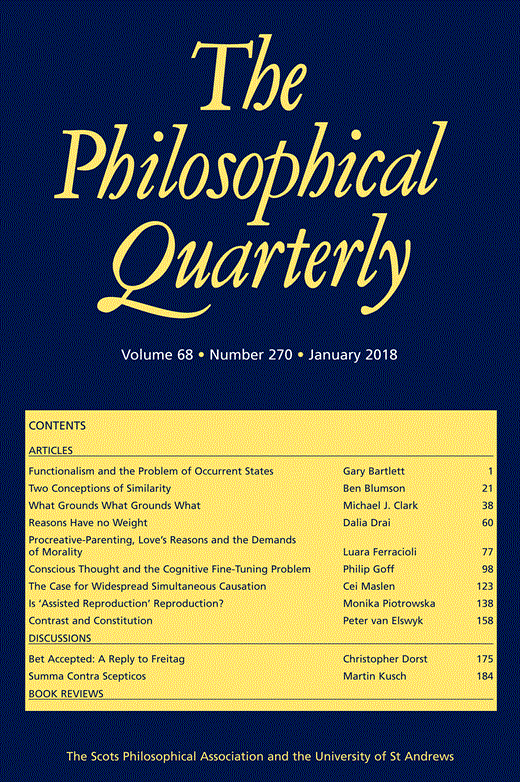-
Views
-
Cite
Cite
John Palmer, Proof, Knowledge, and Scepticism: Essays in Ancient Philosophy III, The Philosophical Quarterly, Volume 68, Issue 270, January 2018, Pages 204–209, https://doi.org/10.1093/pq/pqx011
Close - Share Icon Share
Extract
These two sizeable volumes complete OUP's publication of Jonathan Barnes's collected papers in ancient philosophy. The four volume set constitutes a partial record of the phenomenal career of one of the foremost scholars of ancient philosophy. The first two volumes—Method and Metaphysics (2011) and Logical Matters (2012) —were previously reviewed in vol. 63.1 of this journal (2015: 123–8). The twenty-two essays on epistemological matters in Proof, Knowledge, and Scepticism are devoted to late ancient views regarding the function of logic (chs 1–3), to the notion of proof (chs 4–14) and to ancient scepticism (chs 15–22). The sensible decision to organize Barnes's wide-ranging output thematically rather chronologically was bound to leave some essays without a natural home. Mantissa—the title is taken from the Latin for ‘makeweight’—assembles essays whose themes are other than method, metaphysics, logic or epistemology. Barnes acknowledges that this fourth volume ‘might as well have been called Oddments or Left-overs’ (Essays IV: ix); yet, the items in this volume are hardly minor works or afterthoughts. After essays on ancient ethics, politics and aesthetics (chs 1–6) and on ancient philosophy of mind (chs 7–11), Mantissa includes treatments of such diverse topics as Protagoras's atheism (ch. 12), the fate of the Platonic corpus and Aristotle's library in the Hellenistic age and thereafter (chs 13 and 16), Platonic lexicography (ch. 14), the catalogue of Chrysippus's logical works (ch. 17) and his response to the so-called ‘lazy argument’ (ch. 18), the historical importance of Antiochus of Ascalon (ch. 15), the presentation of Pyrrhonism in Diogenes Laertius IX (ch. 19), Nietzsche's contribution to Laertian studies (ch. 20), Clement of Alexandria's knowledge of Greek philosophy (ch. 21) and the study of Greek philosophy in Victorian Oxford (ch. 23).





